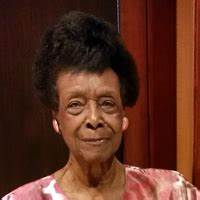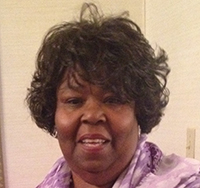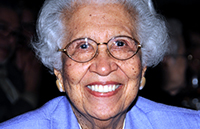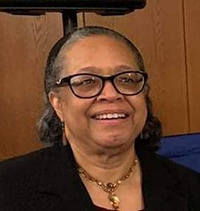Five Black women who are NASW Social Work Pioneers® have been honored for their dedication to the profession, improving their communities, and leading the way as trailblazers. Their achievements continue to inspire social workers today.
Bernice C. Harper

NASW CEO Angelo McClain and President Mildred “Mit” Joyner congratulated Harper on her 100th birthday in February and for her many contributions to the field of social work, both nationally and internationally.
“Coming of age during the Jim Crow era, Dr. Harper was a trailblazer in the field of social work,” McClain said. “She was among the first Black women to receive social work and public health master’s degrees, from USC in the 1940s and Harvard University in the 1950s. She came of age in the 1930s, 40s, 50s, 60s and 70s—the height of Jim Crow and pre-Civil Rights eras. To be a Black woman throughout those decades, she faced extreme racism, sexism and classism. She handled it with grace, style and no resentment.”
Commended by universities, state and federal political leaders, and social work policymakers for her accomplishments over the decades, Harper is still going strong.
“Still active with NASW, a leading board member at the NASW Foundation and other international boards, Dr. Harper is an inspiration to social workers just starting out and to those of us who have been working in the field for decades. She motivates us all,” Joyner said.
Harper was the first Black out-of-state social work student to obtain her MSW at the University of Southern California in 1948 and among the first Black women to earn a Master of Science in Public Health from Harvard University in 1959. She was awarded an honorary doctorate from Faith Grant College in Birmingham, Ala., in 1994.
Mildred Joyner

NASW's current president Joyner, DPS, MSW, BSW, LCSW, was recently honored by West Chester University College of Education and Social Work Wall of Honorees.
In its dedication, the school noted that Joyner joined the West Chester University faculty in 1979. She retired in 2011 as professor emeritus after serving as chair of the undergraduate social work department for several decades.
Her many accomplishments include establishing an MSW program at WCU; developing the civility award and campus climate intervention team; presiding over the Frederick Douglass Society; originating the Frederick Douglass Junior Ambassadors; gathering funds for the annual MLK Day; establishing the Clifford E. DeBaptiste Scholarship for Social Work Students; developing an interdisciplinary race relations course; and serving as the fundraising chair for the Frederick Douglass Statue.
In addition to her election as president of NASW, Joyner also served as president of the Council on Social Work Education and president of the Association of Baccalaureate Social Work Program Directors. In 2021, she was named the inaugural John E. & Barbara S. Jacob Distinguished Endowed Professor at Howard University School of Social Work. Joyner co-authored “Critical Multiculturalism and Intersectionality in a Complex World” (2018); “Critical Multicultural Social Work” (2008); and “Caregivers for Persons Living with HIV/AIDS in Kenya: An Ecological Perspective” (2011).
Her awards include the 2005 AGESW BPD Mit Joyner Gerontology Leadership Award, the first Dr. Inabel Burns Lindsay Award from Howard University School of Social Work, and the prestigious NASW of Pennsylvania Phyllis Black Lifetime Achievement Award (2019).
Esther Jones Langston

The city of Las Vegas and Clark County in Nevada honored Langston as a community trailblazer with a permanent plaque posted at the Historic Westside Legacy Park in Las Vegas.
The plaques are reserved for those who have made a significant contribution to the Historic Westside community through their activism, philanthropy, outreach, education, public impact, partnership, business development, artistic and/or cultural merit, and other efforts in a long-term and demonstrable way.
The plaques include historic information of the honorees, as well as public art throughout the park. There is also a playground, benches and seating areas.
Langston, PhD, MSW, LCSW, professor emeritus and director emerita at the University of Nevada, Las Vegas, is recognized as the first African American social worker in the state of Nevada, as well as the first African American woman employed at UNLV. She is one of the 12 founders of Les Femme Douze, in 1964, to promote cultural awareness, social graces, and educational scholarships for young women.
Her appointment at the UNLV was a first, followed by her being the first African American to become a full professor and a department chair. She broke new ground for other Black people and ethnic minorities to become part of UNLV. This is a social justice accomplishment knowing so few Black Americans were progressing through academia during the early 1970s. She served as a role model to several generations of Black social workers by her presence at a predominantly white institution.
Hortense King McClinton

McClinton, MSW, was the first African American professor hired at the University of North Carolina in 1966 and worked at the School of Social Work. UNC at Chapel Hill is renaming the Aycock Residence Hall as the McClinton Residence Hall after McClinton.
The NASW North Carolina Chapter recommended to the UNC Vice Chancellor and Provost Dr. Robert Blouin and the Chancellor’s Advisory Committee on Naming University Facilities and Units that a building be named in honor of McClinton. Valerie Arendt, executive director of the chapter, notes McClinton has demonstrated a positive impact on the UNC campus and within the community. The 103-year-old McClinton paved the way for African American social workers in North Carolina by removing obstacles and implementing systems to ease their transition from Master of Social Work graduates to full-time social workers, Arendt says.
She also points out that as a trained social worker, McClinton contributed social work skills and knowledge in a field that, at the time, taught more theory than practice. She was the first to teach a course on institutional racism at UNC. McClinton also was the first African American professional social worker to be employed in several public, private, and governmental social agencies, including the Durham County Department of Social Services (DSS) and the Veterans Administration Hospital in Durham, N.C.
Wilma Peebles-Wilkins

Peebles-Wilkins, PhD, DPNAP, dean emerita at Boston University, received a special honor from her alma mater at Case Western Reserve University: a painted portrait of herself displayed on the university’s campus as part of CWRU’s Trailblazer Project.
Peebles-Wilkins joins distinguished alumni as a social work practitioner, scholar, educator and administrator who, like the other honorees, is recognized for innovation in her field.
The university describes The Trailblazer Project as a “portraiture initiative aimed at showcasing the contributions of Case Western Reserve University alumni of color and women and diversifying the images that appear in campus common areas.”
Peebles-Wilkins was also interviewed for an article from the Oberlin College (Ohio) Alumni Magazine, Fall, 2021, about her hometown of Oberlin Village, N.C., as well as for an in-depth video, “Oberlin: A Village Rooted in Freedom.”
The stories reveal how a historic preservation project has helped recover the story of a once-thriving town near Raleigh built after the Civil War by formerly enslaved and free Blacks. Oberlin had more than 1,200 inhabitants before being paved over in the name of progress.
The renovation of two 1880s houses by Preservation North Carolina has exposed remarkable stories about the families who lived there.
The video notes that roads were built that displaced the Oberlin community in the mid-1950s. Many had to leave their homes.
Watch "Oberlin: A Village Rooted in Freedom" on YouTube.